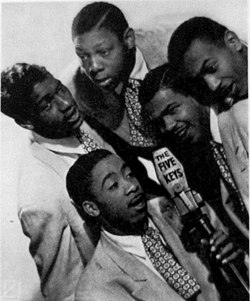| Year | Titles (A-side, B-side)
Both sides from same album except where indicated | Chart positions | Album |
|---|
| US Hot 100 | US R&B |
|---|
| 1951 | "The Glory of Love"
b/w "Hucklebuck with Jimmy" | | 1 | Best of The Five Keys |
"It's Christmas Time"
b/w "Old MacDonald" (Non-album track) | | |
| 1952 | "Yes Sir, That's My Baby"
b/w "Old MacDonald" | | | Non-album tracks |
"Darling"
b/w "Goin' Downtown (8-9-10)"
Unreleased | | |
"Be Anything But Be Mine"
b/w "Red Sails in the Sunset" (from Best of The Five Keys) | | |
"Mistakes"
b/w "How Long" | | |
"I Hadn't Anyone Till You"
b/w "Hold Me" | | |
"I Cried for You"
b/w "Serve Another Round" (from Best of The Five Keys) | | |
| 1953 | "Can't Keep From Crying"
b/w "Come Go My Bail, Louise" | | |
"Mama (Your Daughter Told a Lie on Me)"
b/w "There Ought to Be a Law (Against Breaking a Heart)" | | |
"These Foolish Things"
b/w "Lonesome Old Story" (Non-album track) | | | Best of The Five Keys |
"Teardrops in Your Eyes"
b/w "I'm So High" (Non-album track) | | |
"Oh Babe!"
b/w "My Saddest Hour" | | |
| 1954 | "Love My Loving"
b/w "Someday, Sweetheart" (Non-album track) | | |
"Deep in My Heart"
b/w "How Do You Expect Me to Get It" | | | Non-album tracks |
"Ling, Ting, Tong"
b/w "I'm Alone" (Non-album track) | 28 | 5 | The Fantastic Five Keys |
| 1955 | "Close Your Eyes"
b/w "Doggone It, You Did It" | | 5 |
"My Love"
b/w "Why, Oh Why" | | | Non-album tracks |
"The Verdict"
b/w "Me Make Um Pow Wow" (Non-album track) | | 13 | The Fantastic Five Keys |
"Don't You Know I Love You"
b/w "I Wish I'd Never Learned To Read" | | | Non-album tracks |
| "'Cause You're My Lover" / | | 12 |
| "Gee Whittakers!" | | 14 |
| 1956 | "Story of Love"
b/w "Serve Another Round" (from Best of The Five Keys) | | |
"What Goes On"
b/w "You Break the Rules of Love" | | |
"I Dreamt I Dwelt in Heaven"
b/w "She's the Most" (from The Fantastic Five Keys) | | |
"Peace and Love"
b/w "My Pigeon's Gone" | | |
"Out of Sight, Out of Mind"
b/w "That's Right" | 23 | 12 |
"Wisdom of a Fool"
b/w "Now Don't That Prove I Love You" (Non-album track) | 35 | | The Fantastic Five Keys |
| 1957 | "Let There Be You"
b/w "Tiger Lily" | 83 | | On Stage! |
"It's a Groove"
b/w "Four Walls" | | | Non-album tracks |
"The Blues Don't Care"
b/w "This I Promise You" (Non-album track) | | | The Fantastic Five Keys |
"The Face of an Angel"
b/w "Boom Boom" (from On Stage!) | | | Non-album tracks |
"Do Anything"
b/w "It's a Cryin' Shame" | | |
"From Me to You"
b/w "Whippety Whirl" | | |
| 1958 | "With All My Love"
b/w "You're for Me" | | |
"Handy Andy"
b/w "Emily Please" | | |
"One Great Love"
b/w "Really-O Truly-O" | | |
| 1959 | "I Took Your Love for a Toy"
b/w "Ziggus" | | | The Five Keys |
"Dream On"
b/w "Dancing Senorita" | | |
| 1960 | "How Can I Forget You"
b/w "I Burned Your Letter" | | |
"Gonna Be Too Late"
b/w "Rosetta" | | |
"I Didn't Know"
b/w "No Says My Heart" (from Rhythm and Blues Hits - Past and Present) | | | Non-album track |
"Valley of Love"
b/w "Bimbo" | | | Rhythm and Blues Hits - Past and Present |
| 1961 | "Stop Your Crying"
b/w "Do Something for Me" | | |
| 1962 | "Out of Sight, Out of Mind"
b/w "You're the One" | | | Non-album tracks |
"From the Bottom of My Heart"
b/w "Out of Sight, Out of Mind" | | |
| 1964 | "I'll Never Stop Loving You"
b/w "I Can't Escape from You" | | | Rhythm and Blues Hits - Past and Present |
| 1967 | "Hey Girl"
b/w "No Matter" | | | Non-album tracks |
| 1973 | "Goddess of Love"
b/w "Stop - What You're Doing to Me" | | |
|
